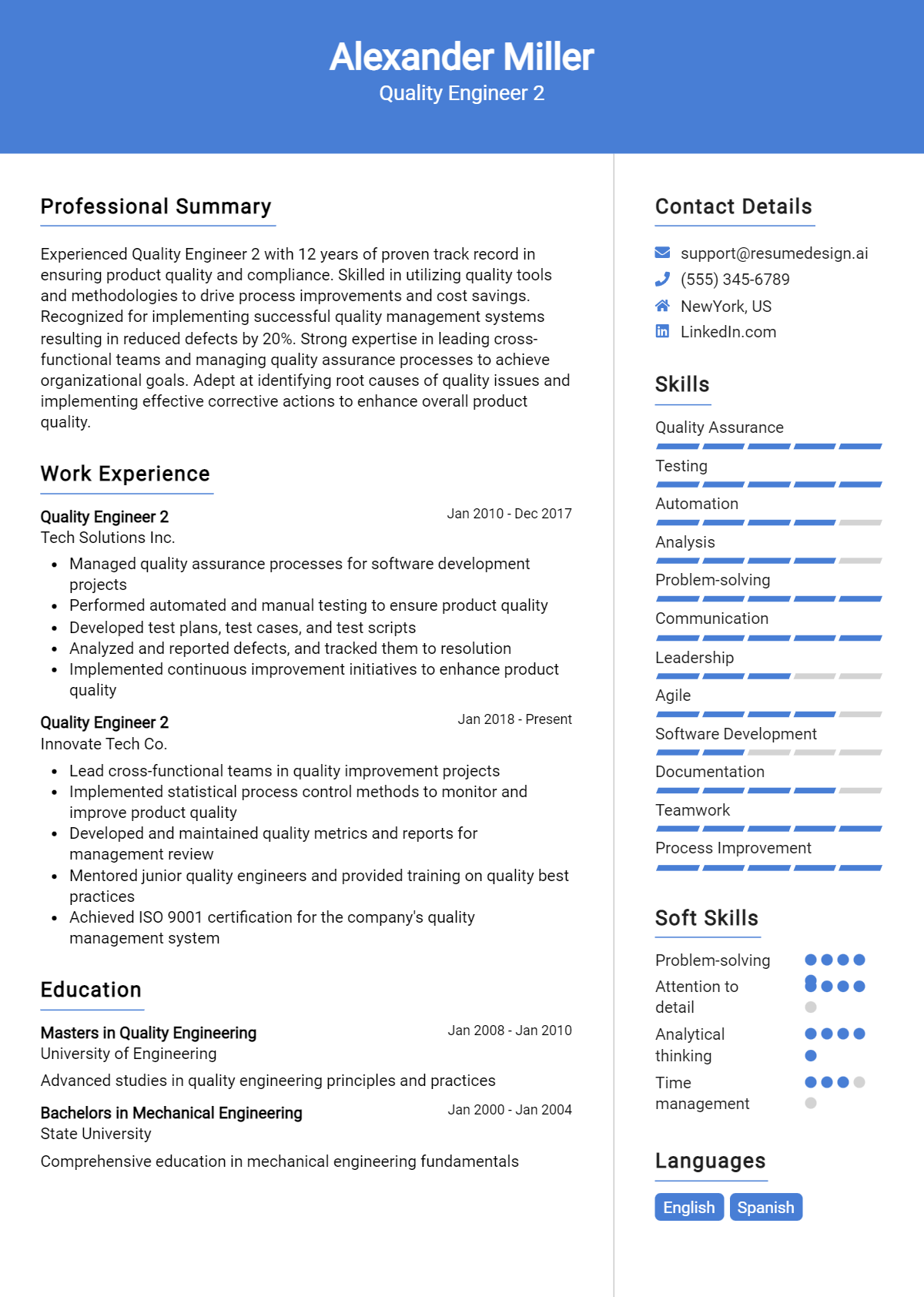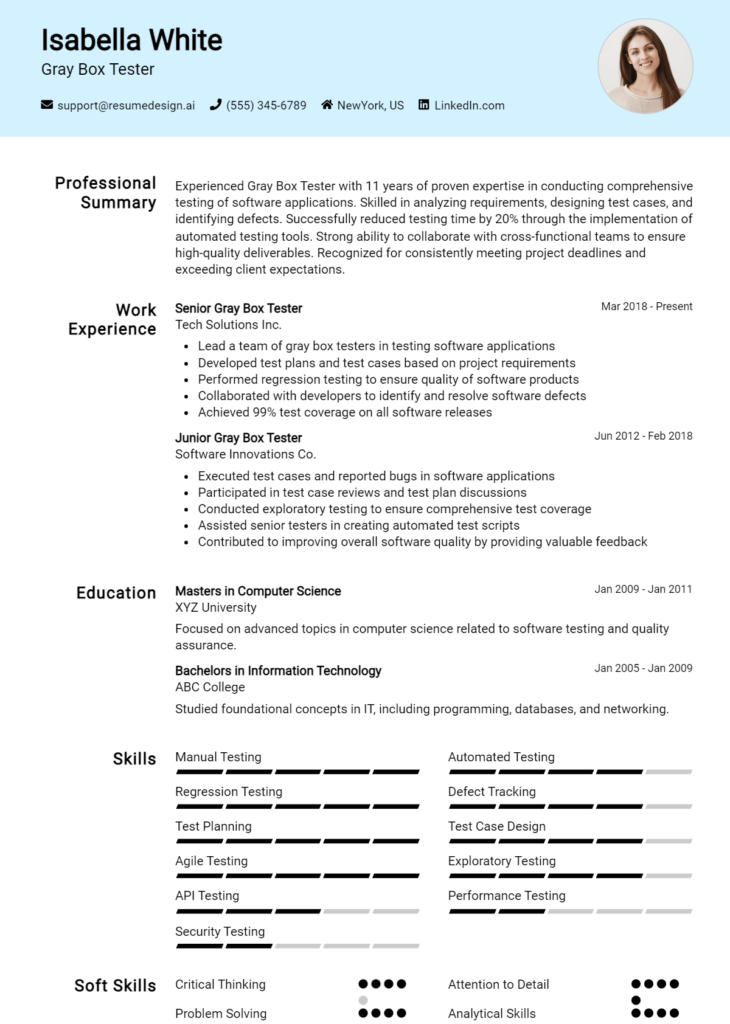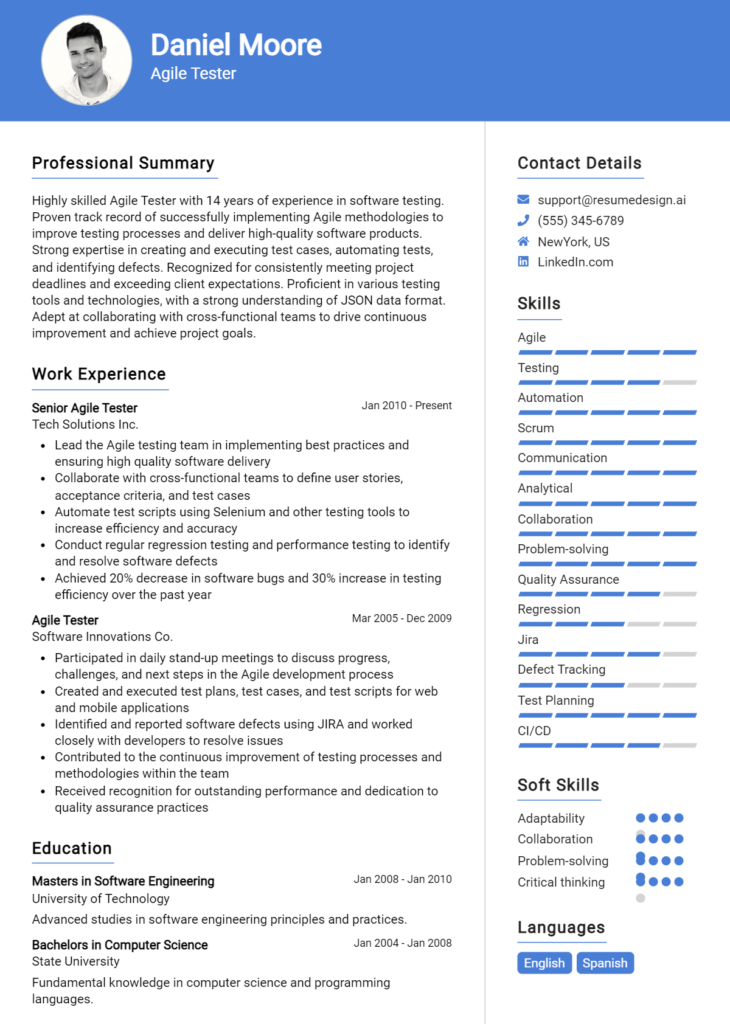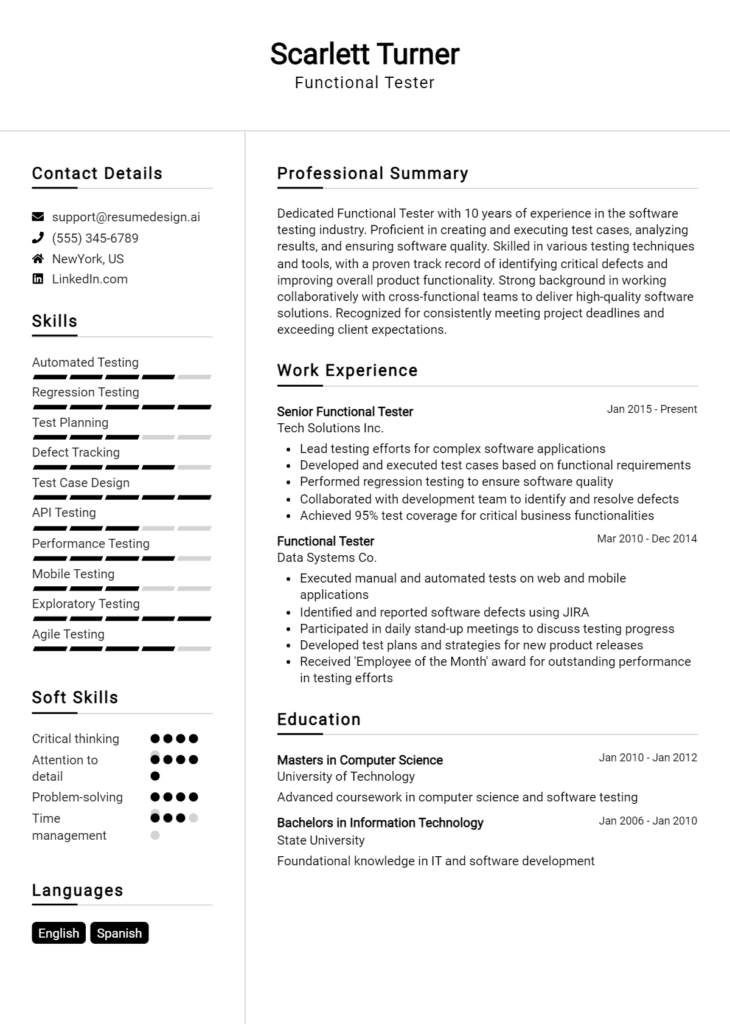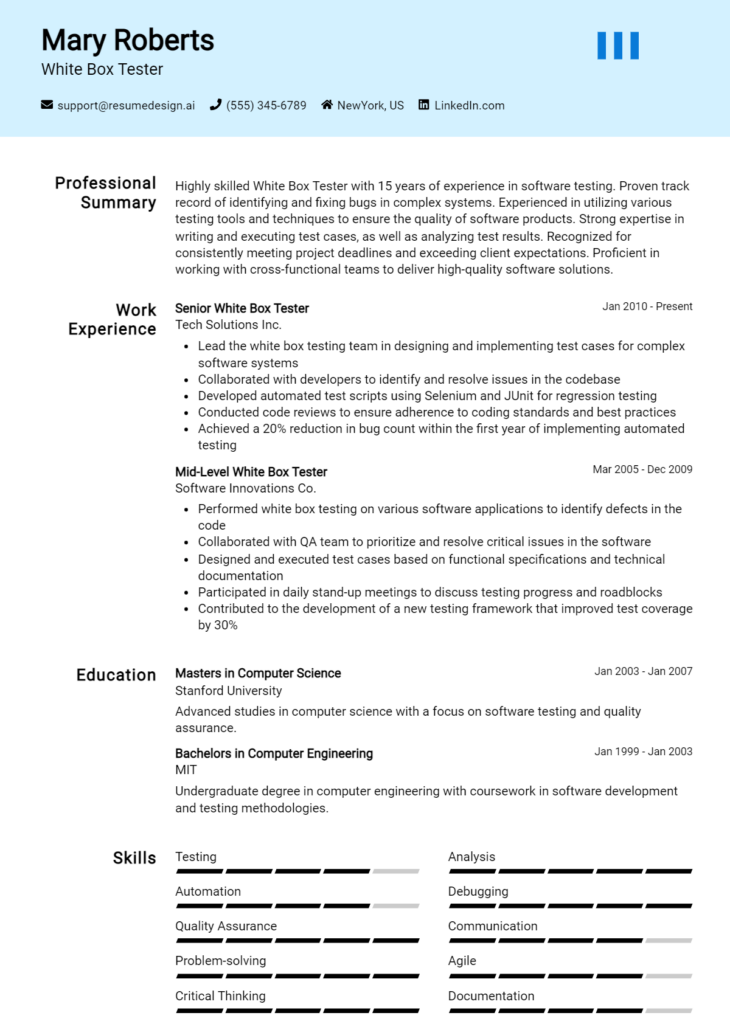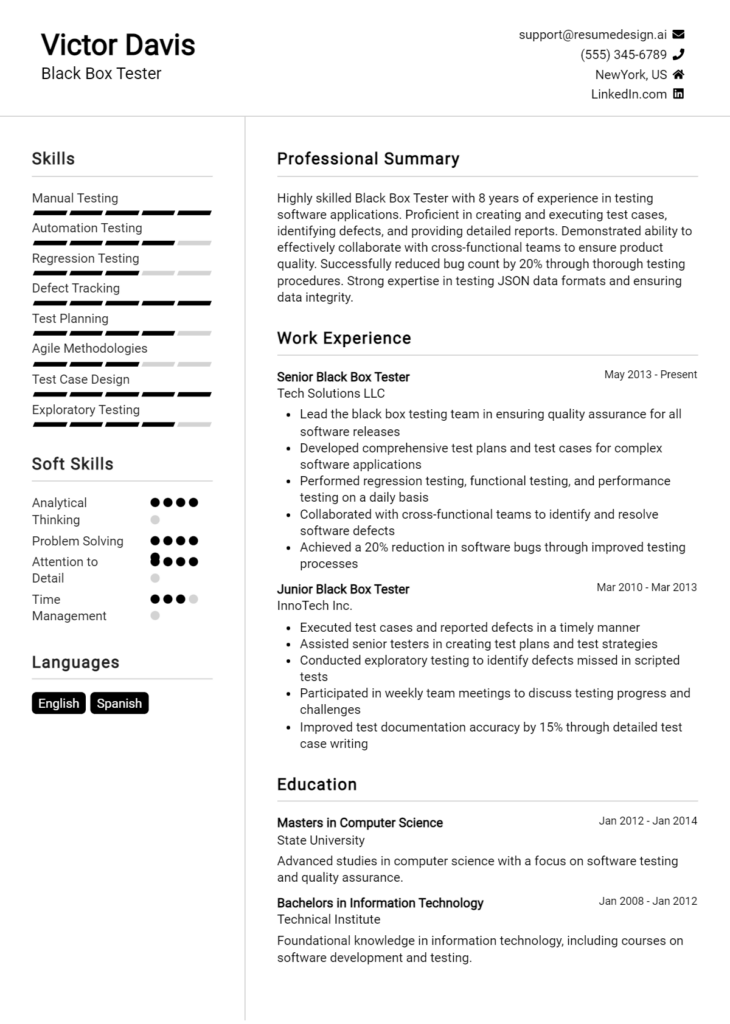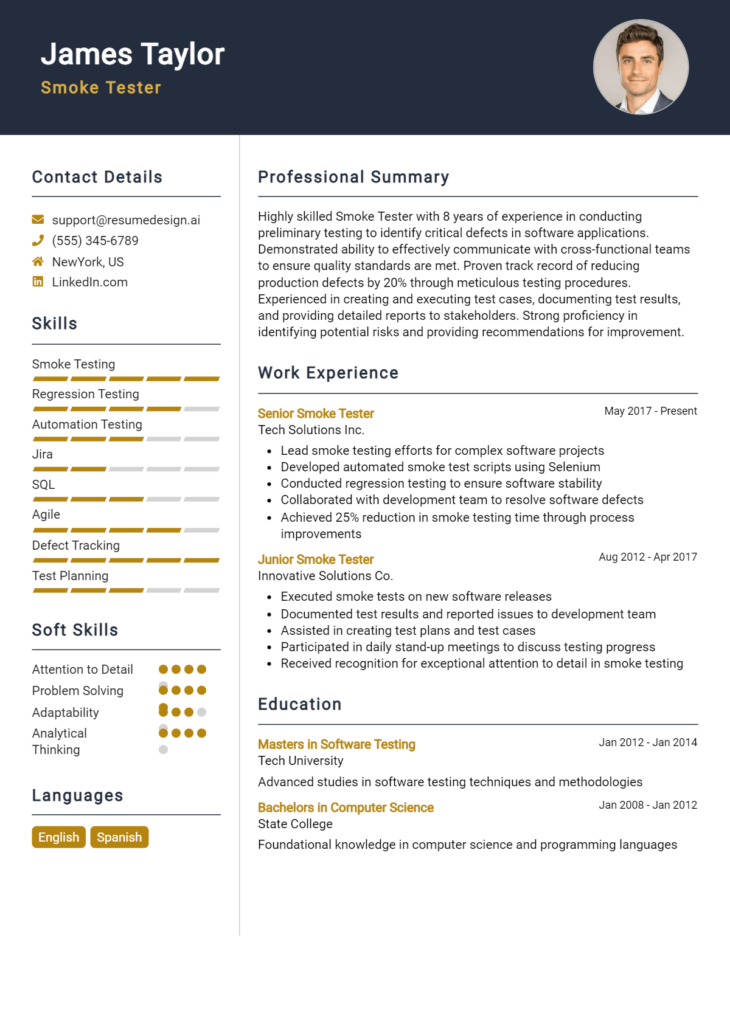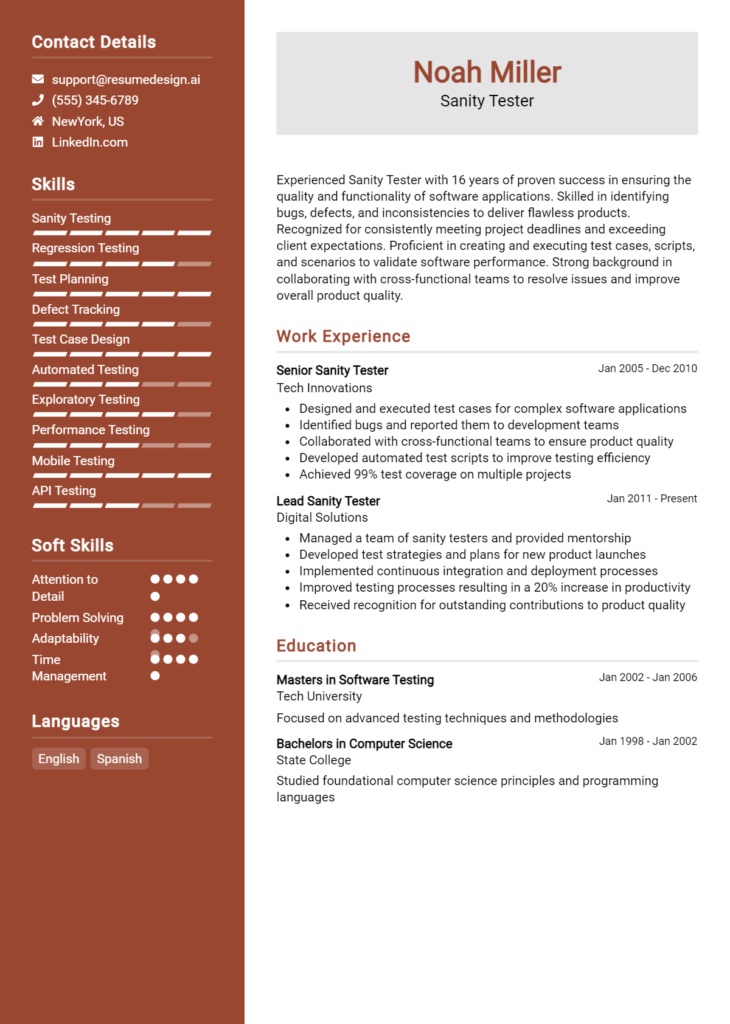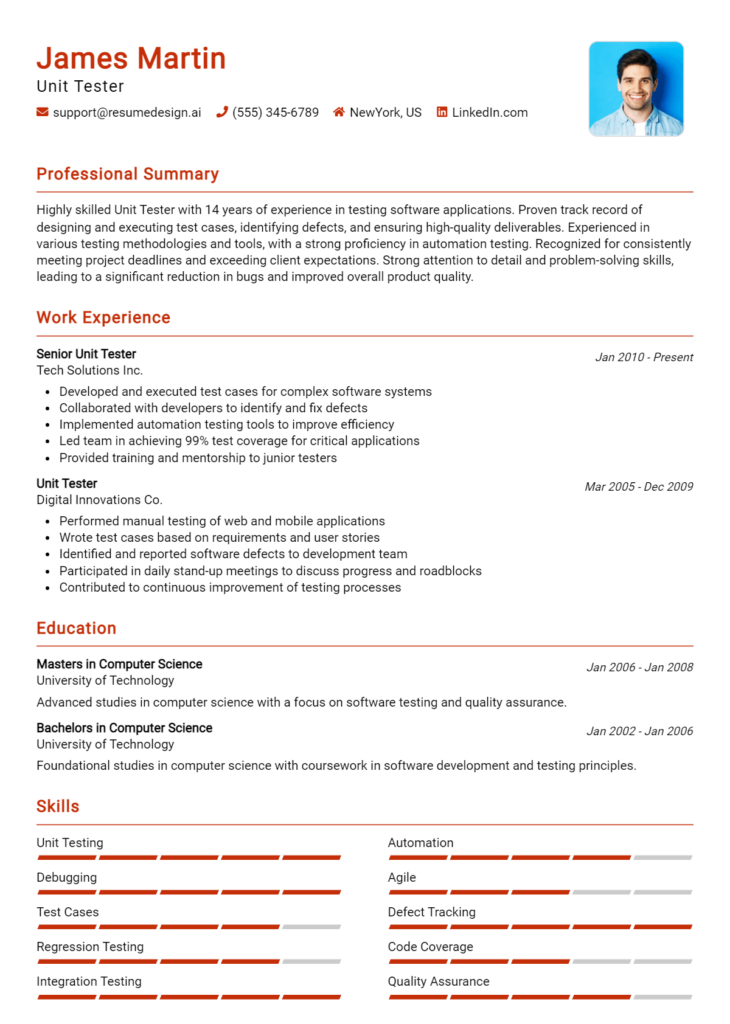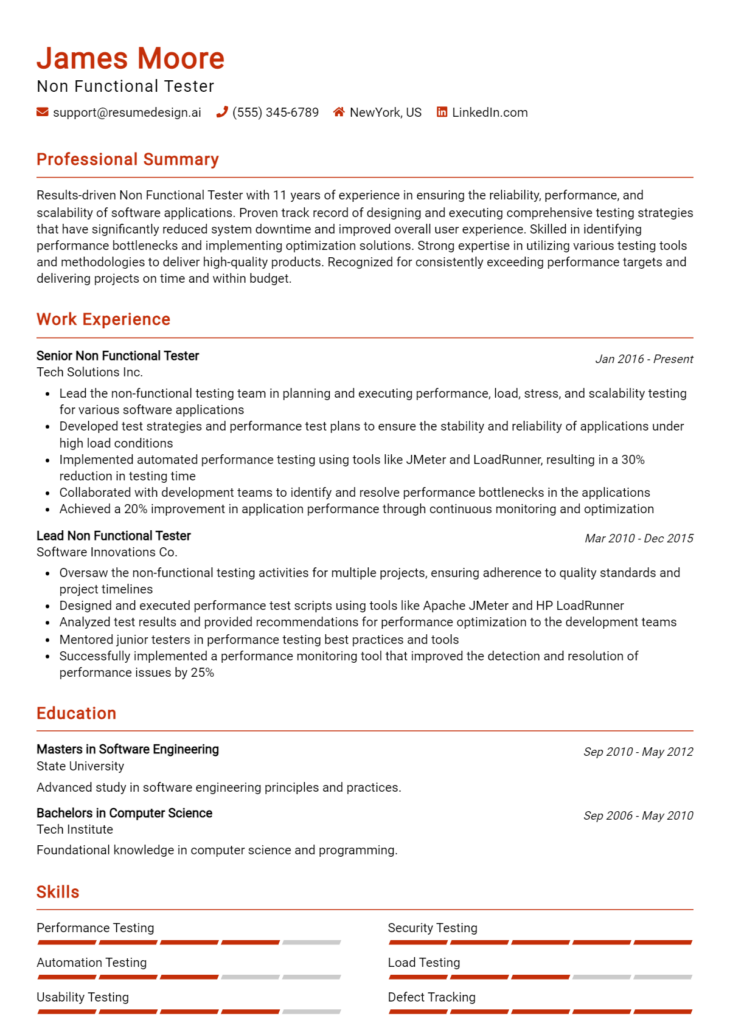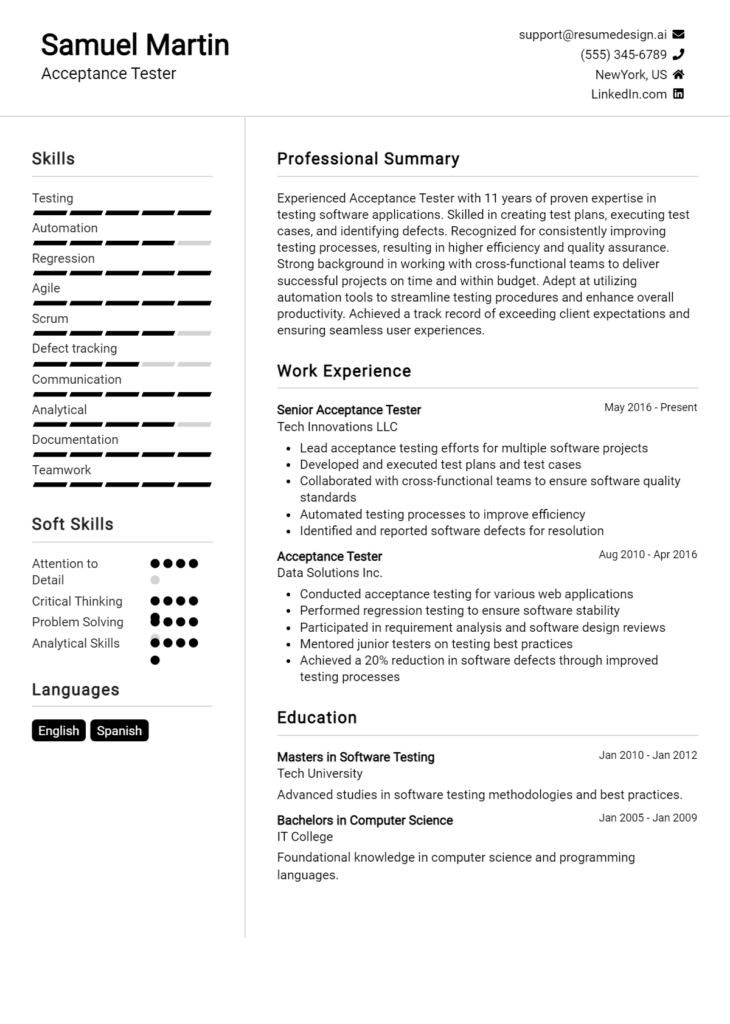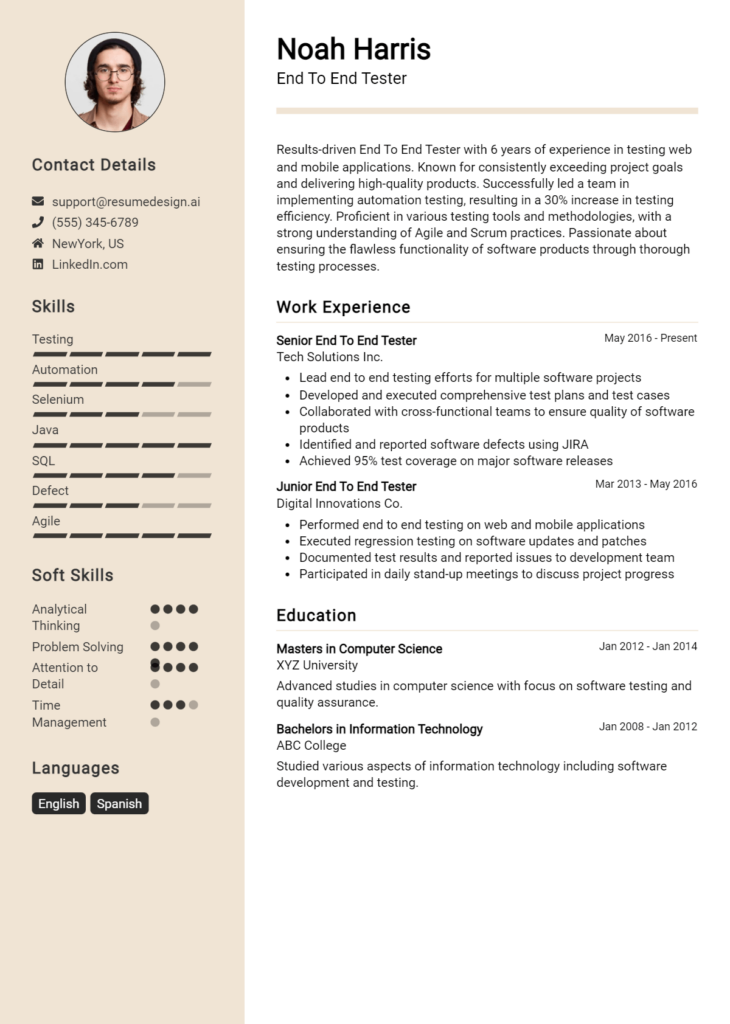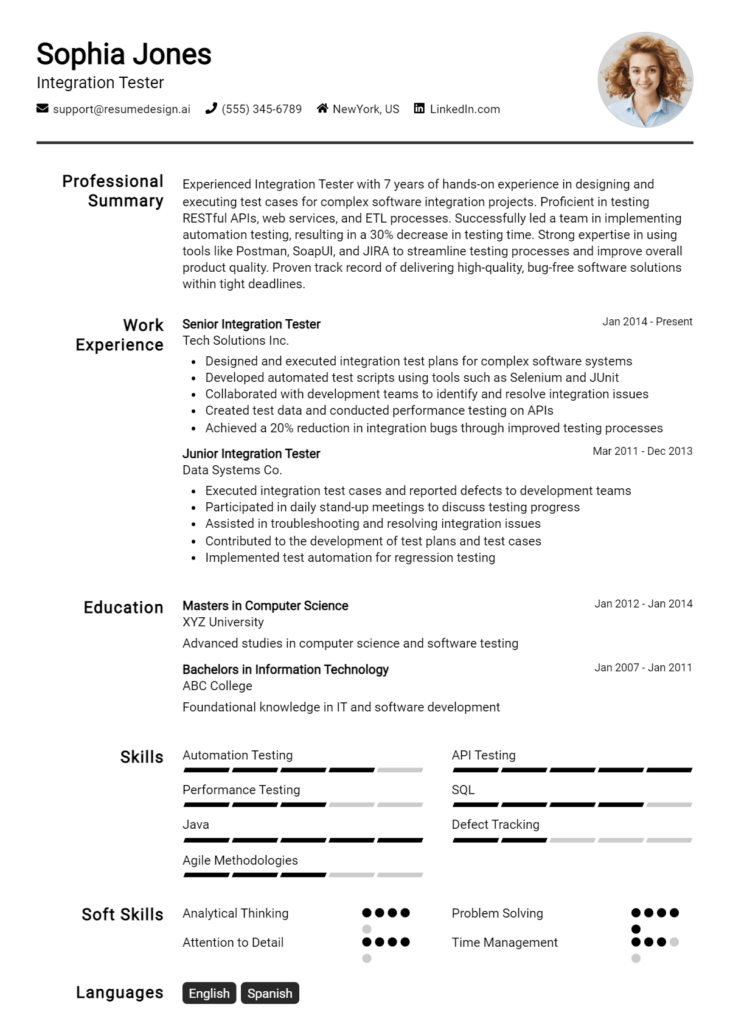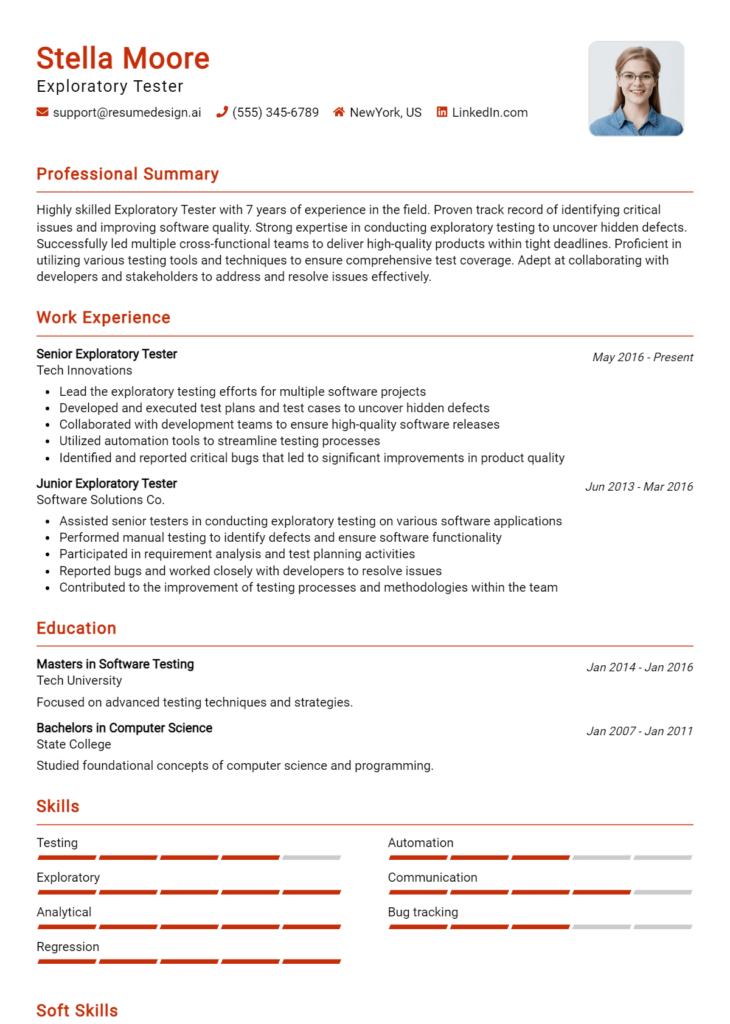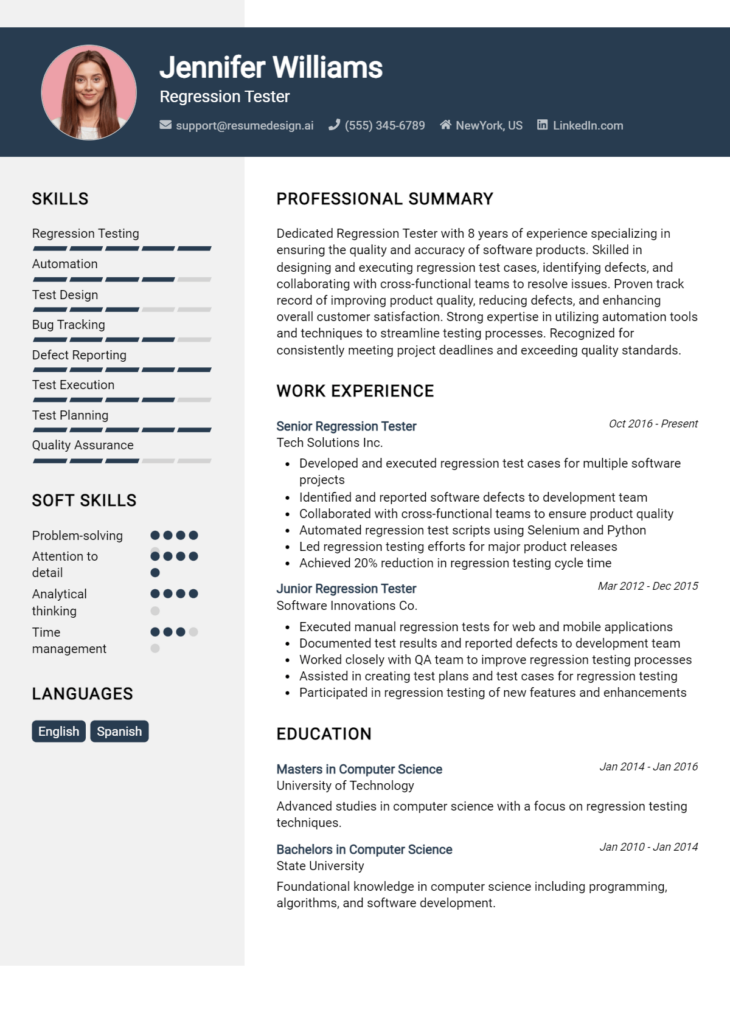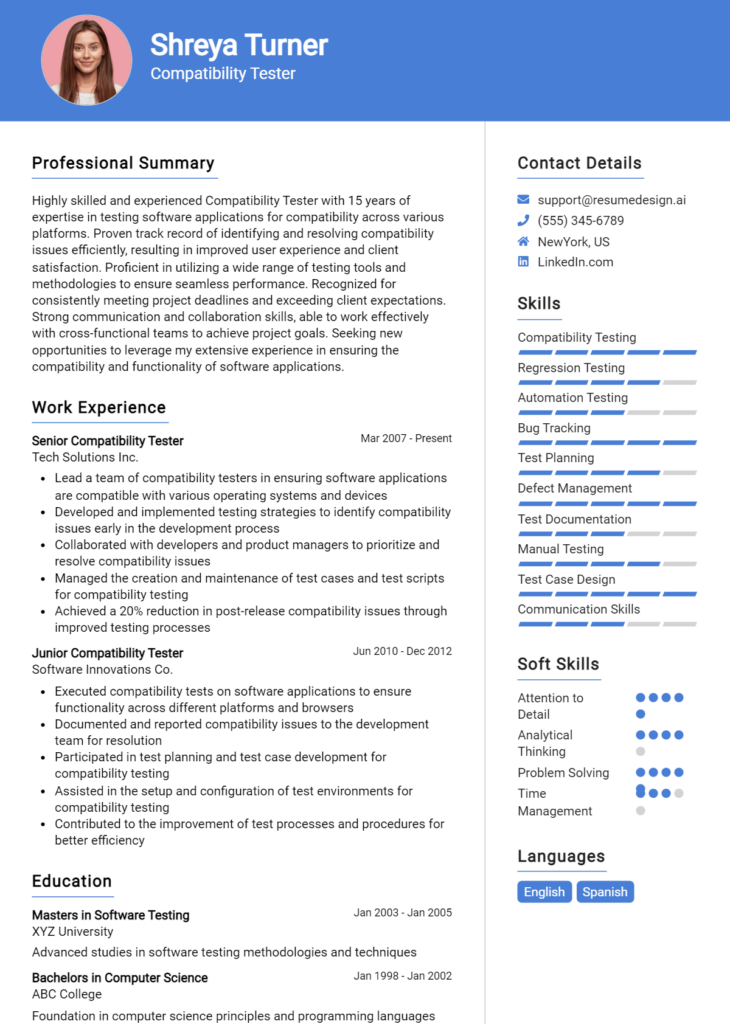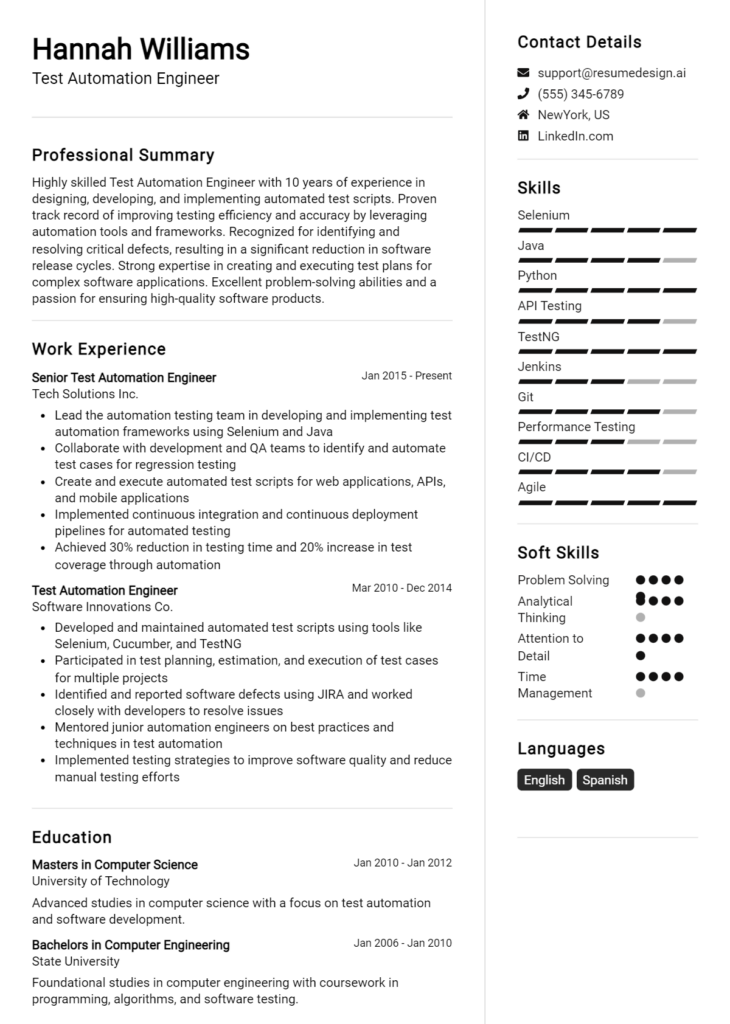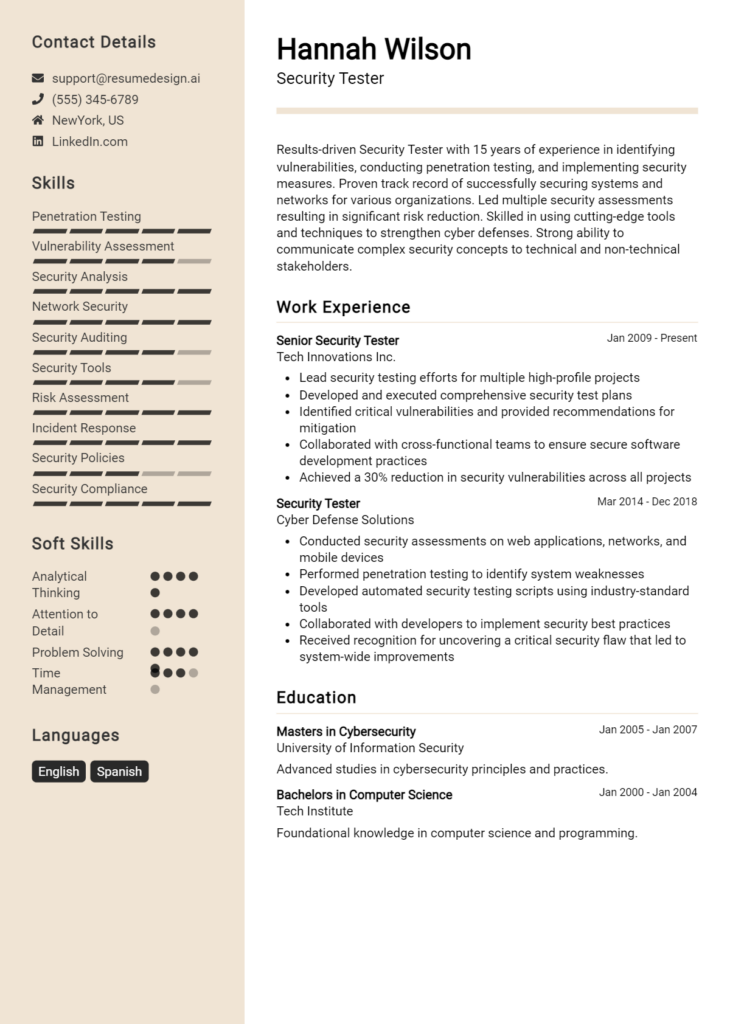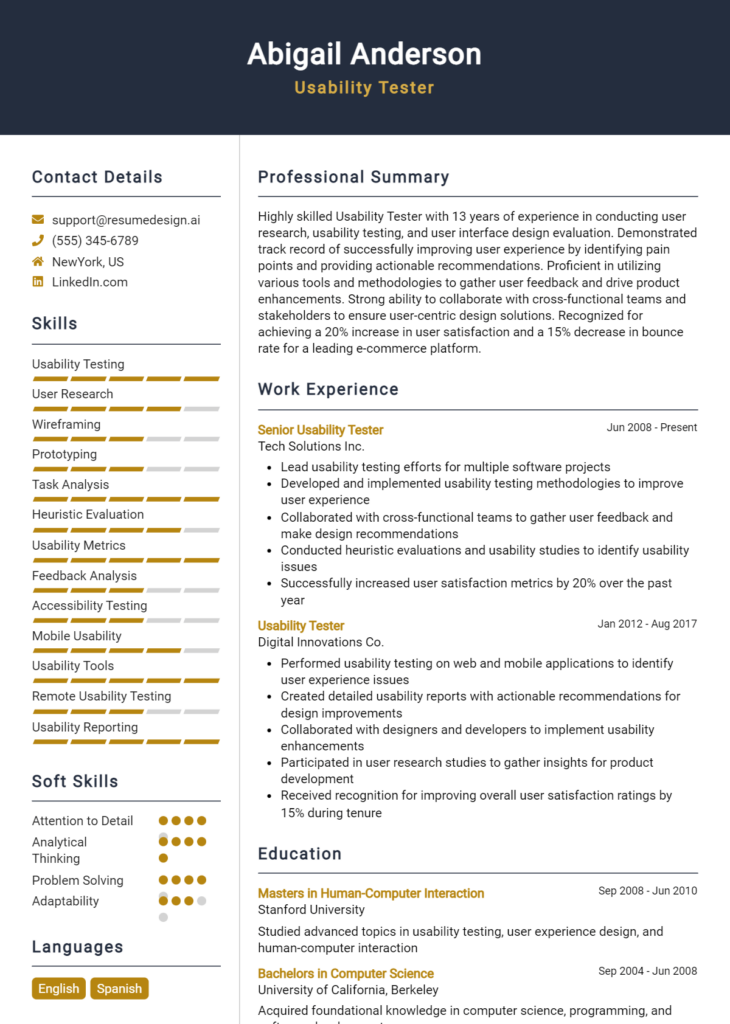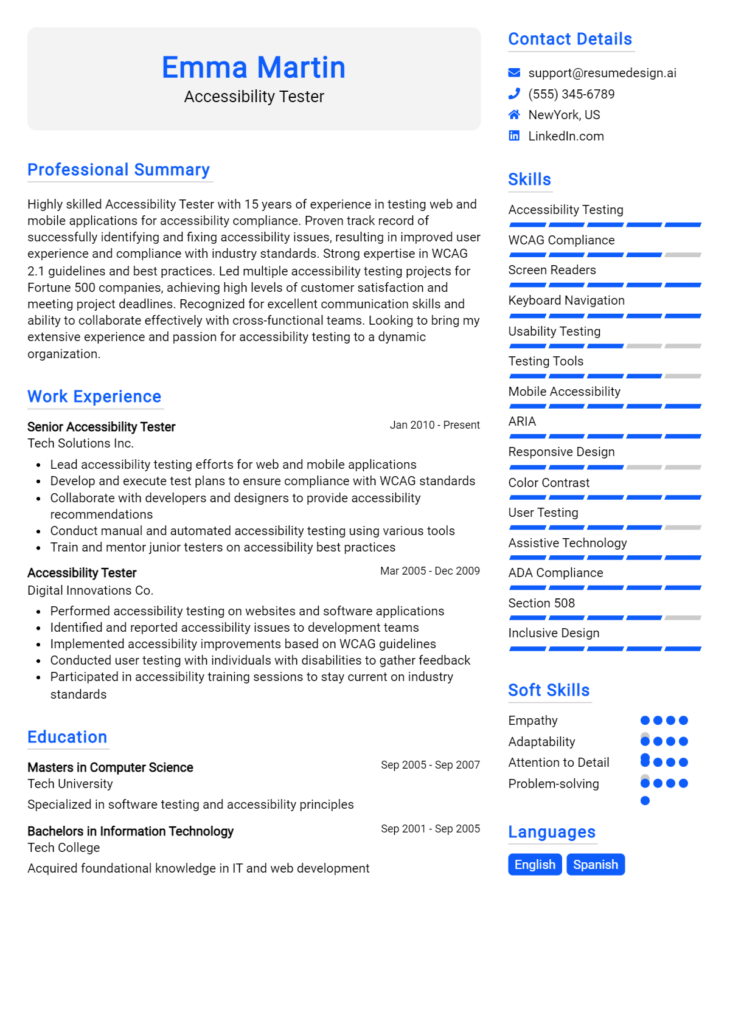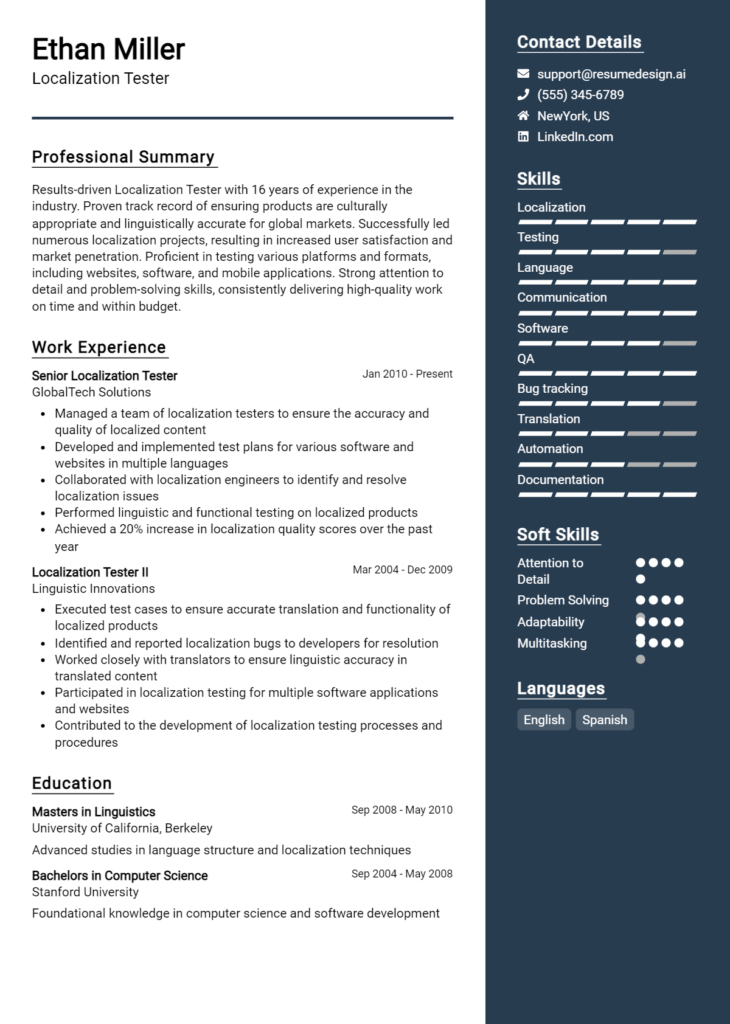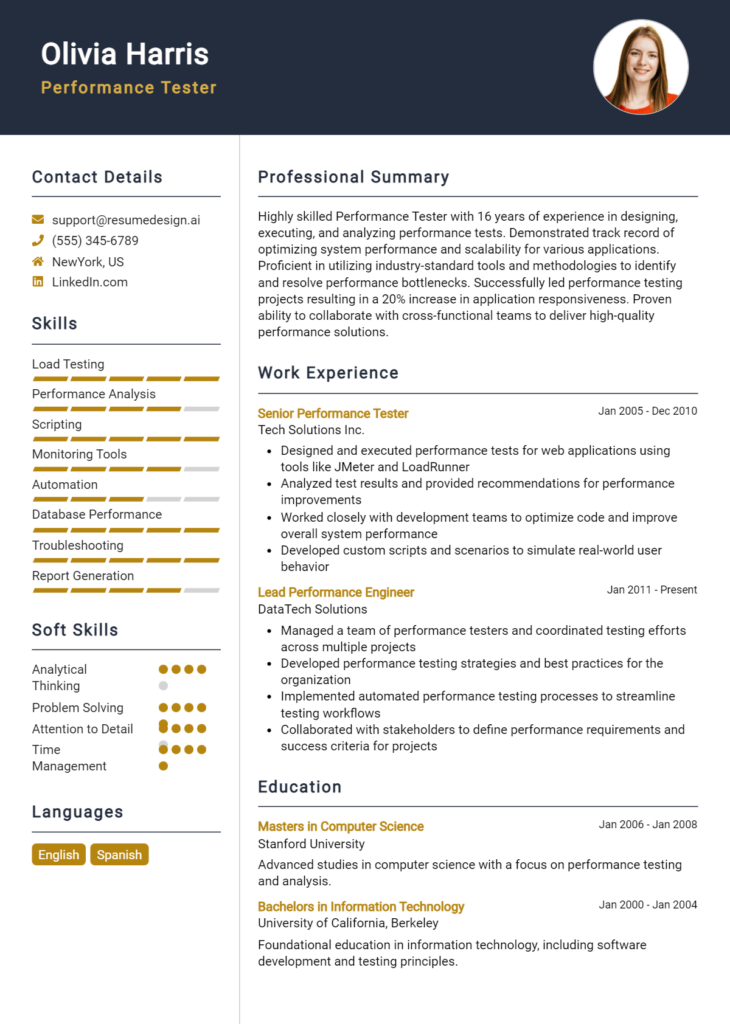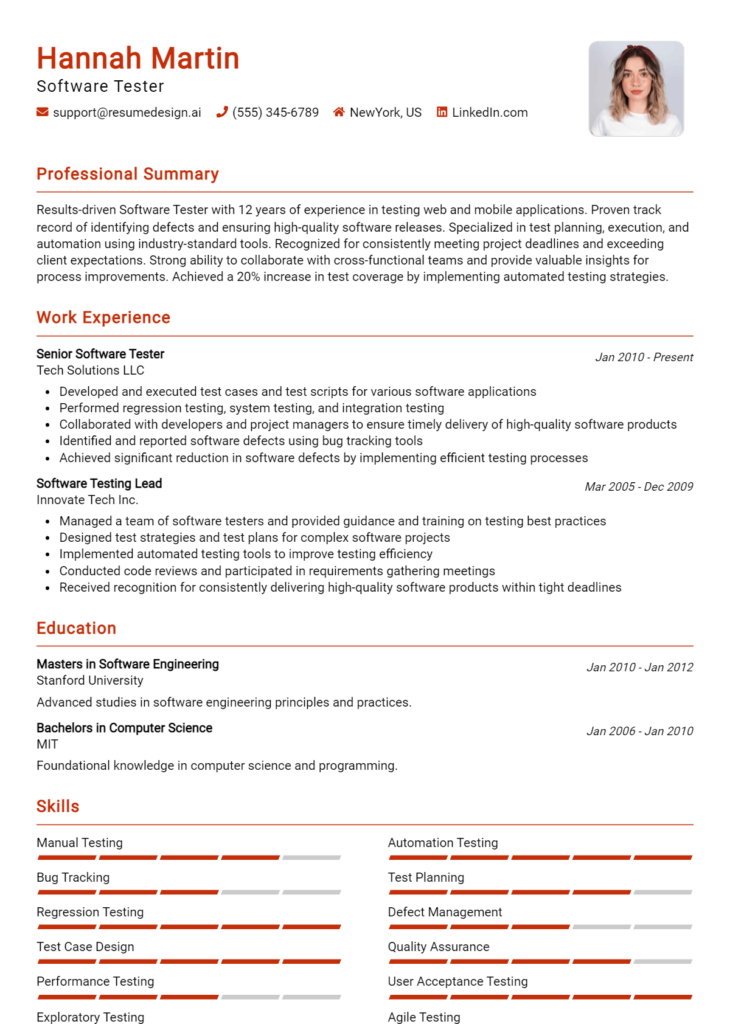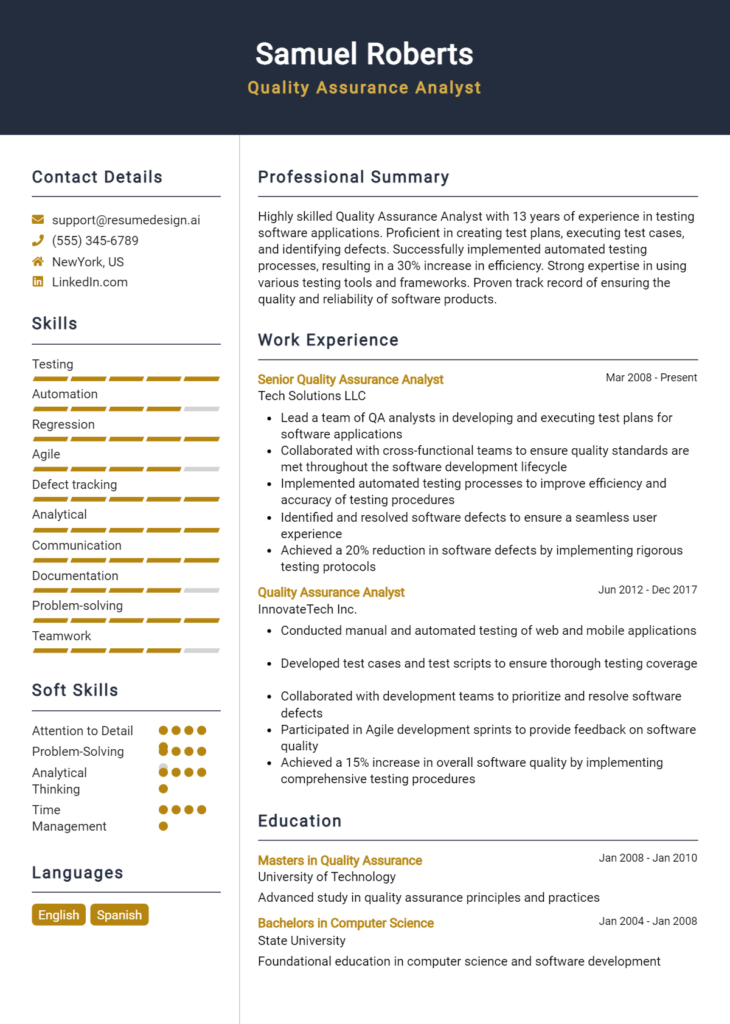Quality Engineer Core Responsibilities
A Quality Engineer plays a crucial role in ensuring product excellence by collaborating across various departments such as production, design, and supply chain. Key responsibilities include developing quality standards, conducting audits, and analyzing data to identify areas for improvement. Essential skills encompass technical expertise, operational knowledge, and strong problem-solving abilities, all of which are vital for driving organizational goals. A well-structured resume can effectively highlight these qualifications, showcasing a candidate's value to potential employers.
Common Responsibilities Listed on Quality Engineer Resume
- Develop and implement quality assurance protocols and procedures.
- Conduct regular audits and inspections of production processes.
- Collaborate with cross-functional teams to identify and resolve quality issues.
- Analyze data to track quality metrics and trends.
- Provide training and guidance to staff on quality standards.
- Prepare detailed reports on quality performance and improvement plans.
- Utilize statistical methods to enhance product reliability.
- Support product development by conducting failure mode and effects analysis (FMEA).
- Implement corrective actions for non-conformance and defects.
- Maintain documentation for compliance with industry regulations.
- Participate in root cause analysis to prevent future defects.
- Coordinate with suppliers to ensure quality materials and components.
High-Level Resume Tips for Quality Engineer Professionals
In today's competitive job market, a well-crafted resume is essential for Quality Engineer professionals aiming to make a strong first impression on potential employers. Your resume serves as the initial touchpoint for hiring managers, showcasing not only your technical skills but also your achievements and contributions to past projects. It needs to effectively communicate your qualifications and demonstrate your value in ensuring product quality and compliance. This guide will provide practical and actionable resume tips specifically tailored for Quality Engineer professionals, helping you to stand out in a crowded field.
Top Resume Tips for Quality Engineer Professionals
- Tailor your resume to each job description by using relevant keywords that match the requirements and responsibilities outlined in the posting.
- Highlight your relevant experience by including specific roles and projects that showcase your expertise in quality assurance and testing methodologies.
- Quantify your achievements by using metrics and data points, such as the percentage of defect reduction or improvements in process efficiency.
- Emphasize industry-specific skills such as Six Sigma, ISO standards, and statistical process control, which are highly valued in the field.
- Include certifications relevant to quality engineering, such as Certified Quality Engineer (CQE) or Certified Quality Auditor (CQA), to demonstrate your commitment to professional development.
- Utilize a clean and professional format that makes your resume easy to read, with clear headings and organized sections.
- Incorporate a strong summary statement at the top of your resume that highlights your key skills and what you bring to potential employers.
- Provide examples of cross-functional collaboration, illustrating your ability to work with various teams to enhance quality processes.
- List any software tools you are proficient in, such as QMS software, test automation tools, or data analysis programs, as these are crucial for many Quality Engineer roles.
By implementing these tips, Quality Engineer professionals can significantly enhance their resumes, increasing their chances of capturing the attention of hiring managers and securing interviews in the field. A strategic approach to resume writing not only highlights your qualifications but also positions you as a strong candidate ready to contribute to an organization’s quality objectives.
Why Resume Headlines & Titles are Important for Quality Engineer
In the competitive field of quality engineering, a well-crafted resume is essential for standing out among numerous candidates. Resume headlines and titles serve as the first impression that hiring managers have of a job seeker, encapsulating their key qualifications in a concise and impactful phrase. A strong headline immediately grabs attention, summarizing a candidate’s expertise, skills, and experience relevant to the position being applied for. By being concise, relevant, and directly related to the job, these headlines can significantly enhance a resume’s effectiveness, making it easier for hiring professionals to recognize a candidate’s potential fit for their organization.
Best Practices for Crafting Resume Headlines for Quality Engineer
- Keep it concise: Aim for one impactful phrase that summarizes your qualifications.
- Be role-specific: Tailor your headline to align with the specific quality engineering position.
- Highlight key skills: Focus on the most relevant skills or certifications in your headline.
- Use action-oriented language: Start with strong verbs or adjectives to convey competence.
- Incorporate keywords: Use industry-specific terms that align with the job description.
- Avoid jargon: Ensure clarity by using straightforward language that is easy to understand.
- Showcase accomplishments: If applicable, include notable achievements that underline your expertise.
- Revise and refine: Regularly update your headline to reflect your evolving skills and experience.
Example Resume Headlines for Quality Engineer
Strong Resume Headlines
Results-Driven Quality Engineer with 5+ Years of Experience in Lean Manufacturing
Certified Quality Engineer Specializing in Six Sigma and Process Improvement
Detail-Oriented Quality Assurance Professional with Proven Track Record in Reducing Defects
Innovative Quality Engineer Focused on Enhancing Product Reliability and Compliance
Weak Resume Headlines
Quality Engineer Looking for Job
Experienced Engineer
The strong headlines are effective because they are specific, showcasing the candidate’s relevant skills and experience in a way that aligns with the job description, making it easy for hiring managers to see their potential value. In contrast, the weak headlines fail to impress because they lack specificity and do not provide any meaningful insight into the candidate’s qualifications or expertise. By avoiding generic phrases and focusing on impactful language, job seekers can significantly enhance their chances of catching the attention of hiring professionals.
Writing an Exceptional Quality Engineer Resume Summary
A well-crafted resume summary is crucial for a Quality Engineer as it serves as the first impression of the candidate to potential employers. This brief yet impactful paragraph quickly captures the attention of hiring managers by highlighting key skills, relevant experience, and significant accomplishments that align with the job role. A strong summary not only showcases the candidate's expertise in quality assurance and engineering processes but also conveys their ability to contribute to the organization's success. It should be concise, compelling, and tailored to the specific job description, ensuring that the candidate stands out in a competitive job market.
Best Practices for Writing a Quality Engineer Resume Summary
- Quantify achievements: Use numbers and metrics to demonstrate the impact of your work.
- Focus on relevant skills: Highlight technical skills and soft skills that are pertinent to the role.
- Tailor the summary: Customize the summary for each job application based on the job description.
- Be concise: Keep the summary brief, ideally within 3-5 sentences, to maintain the reader's interest.
- Use powerful language: Employ strong action verbs and industry-specific terminology.
- Showcase career progression: Mention any significant advancements or roles that reflect growth in your career.
- Highlight certifications: If applicable, include relevant certifications that add credibility to your expertise.
- Convey passion for quality: Express enthusiasm for quality engineering and a commitment to excellence.
Example Quality Engineer Resume Summaries
Strong Resume Summaries
Detail-oriented Quality Engineer with over 5 years of experience in implementing quality management systems that resulted in a 30% reduction in defect rates. Proven ability to lead cross-functional teams in root cause analysis and corrective action implementation, enhancing product reliability and customer satisfaction.
Results-driven Quality Engineer skilled in ISO 9001 and Six Sigma methodologies, achieving a 25% increase in process efficiency through rigorous quality audits and continuous improvement initiatives. Adept at utilizing statistical process control (SPC) to monitor and optimize manufacturing processes.
Dynamic Quality Engineer with a track record of successfully managing quality assurance projects in fast-paced environments. Spearheaded a project that reduced production downtime by 15% through the implementation of lean manufacturing principles and effective training programs.
Weak Resume Summaries
Quality Engineer with experience in quality control and some knowledge of engineering principles. Looking for a challenging position.
Dedicated professional with a background in quality assurance. Interested in contributing to a team and improving processes.
The examples of strong resume summaries are considered effective because they provide specific details about the candidate's achievements, quantify results, and directly relate to the skills and responsibilities required for the Quality Engineer role. In contrast, the weak summaries lack specificity, fail to demonstrate measurable impact, and appear overly generic, making it difficult for hiring managers to assess the candidate's qualifications or differentiate them from other applicants.
Work Experience Section for Quality Engineer Resume
The work experience section of a Quality Engineer resume is critical as it provides potential employers with a clear understanding of a candidate's technical skills, leadership abilities, and dedication to delivering high-quality products. This section not only highlights relevant past roles and responsibilities but also emphasizes the candidate's capacity to manage teams effectively and ensure compliance with industry standards. By quantifying achievements—be it through improved product quality, reduced defect rates, or successful project completions—candidates can effectively demonstrate their impact in previous positions, making their experience more compelling and relevant to prospective employers.
Best Practices for Quality Engineer Work Experience
- Use specific metrics to quantify achievements, such as percentage improvements in product quality or reductions in defect rates.
- Highlight technical skills that align with the job description, including tools, methodologies, and processes relevant to quality engineering.
- Showcase leadership experiences, particularly in managing teams, projects, or cross-functional collaborations.
- Detail your role in continuous improvement initiatives and how they positively impacted product quality and efficiency.
- Utilize action verbs to convey responsibilities and accomplishments dynamically.
- Include industry-standard certifications or training that validate technical expertise and commitment to quality engineering.
- Tailor your experiences to align with the specific requirements of the job you are applying for.
- Incorporate feedback or recognition received from stakeholders to demonstrate the value of your contributions.
Example Work Experiences for Quality Engineer
Strong Experiences
- Led a cross-functional team to reduce defect rates by 30% within six months, implementing new quality assurance protocols that resulted in a 15% increase in customer satisfaction scores.
- Developed and executed a comprehensive testing strategy for a new product line that successfully met all regulatory requirements, leading to a 20% reduction in time-to-market.
- Collaborated with software developers to enhance the automated testing framework, which increased testing efficiency by 40% and reduced manual testing efforts significantly.
- Trained and mentored a team of junior quality engineers, fostering a culture of continuous improvement that contributed to a 25% year-over-year reduction in product recalls.
Weak Experiences
- Worked on quality control aspects of various projects without specific details on outcomes or contributions.
- Responsible for testing products, but there were no metrics or achievements noted to demonstrate effectiveness.
- Participated in team meetings and discussions about quality issues without specifying any leadership or impact on results.
- Assisted in quality assurance tasks, but lacked clarity on the scope of responsibilities or improvements made.
The examples listed as strong experiences effectively highlight measurable outcomes, showcasing the candidate's technical leadership and collaborative efforts in enhancing product quality. They provide specific metrics and results that demonstrate a clear impact on the organization. In contrast, the weak experiences fail to provide detailed information about contributions or achievements, lacking the necessary quantifiable results and clarity, which diminishes their effectiveness in conveying the candidate's qualifications.
Education and Certifications Section for Quality Engineer Resume
The education and certifications section of a Quality Engineer resume plays a crucial role in establishing the candidate's qualifications and expertise in the field. This section serves to highlight the academic background, relevant industry certifications, and commitment to continuous learning that are essential for success in quality engineering. By providing details on relevant coursework, certifications, and any specialized training, candidates can enhance their credibility and demonstrate their alignment with the specific requirements of the job role, making them stand out to potential employers.
Best Practices for Quality Engineer Education and Certifications
- Prioritize relevant degrees in engineering, quality assurance, or related fields.
- Include industry-recognized certifications such as Six Sigma, ASQ Certified Quality Engineer, or ISO 9001.
- Detail any specialized training or workshops that pertain to quality engineering methodologies.
- List relevant coursework that demonstrates knowledge of quality control processes and tools.
- Use clear and concise formatting to enhance readability and ensure important information stands out.
- Highlight advanced degrees (Master’s or PhD) if applicable, as they can set candidates apart.
- Update the section regularly to reflect new qualifications and certifications as they are earned.
- Keep the focus on qualifications that are directly applicable to the job description provided.
Example Education and Certifications for Quality Engineer
Strong Examples
- Bachelor of Science in Quality Assurance, University of Engineering, 2020
- Certified Quality Engineer (CQE) from the American Society for Quality (ASQ), 2021
- Six Sigma Green Belt Certification, 2022
- Coursework in Statistical Process Control and Quality Management Systems
Weak Examples
- Bachelor of Arts in History, University of Liberal Arts, 2015
- Certification in Basic Computer Skills, 2018
- High School Diploma, 2012
- Outdated certification in Quality Control from 2010, no longer relevant
The examples provided are considered strong or weak based on their relevance to the Quality Engineer role. Strong examples showcase degrees and certifications that directly align with the technical and quality-focused nature of the position, enhancing the candidate's qualifications. In contrast, weak examples reflect irrelevant educational backgrounds or outdated certifications that do not contribute to the candidate's suitability for a quality engineering position, potentially diminishing their appeal to employers.
Top Skills & Keywords for Quality Engineer Resume
In the competitive field of quality engineering, showcasing the right skills on your resume is crucial to stand out to potential employers. A well-crafted resume that emphasizes both hard and soft skills can significantly enhance your chances of landing an interview. Quality engineers play a vital role in ensuring that products meet the required standards and specifications, and the skills you highlight can demonstrate your capability to contribute effectively to a team. By articulating your skills clearly, you not only align yourself with the job requirements but also reflect your professional growth and adaptability in a rapidly changing industry. For more insight into how skills can elevate your resume, explore our detailed guide on skills and how to present your work experience.
Top Hard & Soft Skills for Quality Engineer
Soft Skills
- Attention to Detail
- Problem-Solving
- Communication Skills
- Team Collaboration
- Time Management
- Adaptability
- Critical Thinking
- Analytical Skills
- Leadership
- Conflict Resolution
- Creativity
- Interpersonal Skills
- Decision Making
- Customer Orientation
- Initiative
- Stress Management
- Negotiation Skills
Hard Skills
- Statistical Process Control (SPC)
- Quality Management Systems (QMS)
- ISO Standards Compliance
- Failure Mode and Effects Analysis (FMEA)
- Root Cause Analysis (RCA)
- Six Sigma Methodologies
- Lean Manufacturing Principles
- Inspection Techniques
- Risk Management
- Quality Assurance Testing
- Software Quality Assurance (SQA)
- Data Analysis Tools (e.g., Minitab, Excel)
- Process Mapping
- Auditing Techniques
- Engineering Drawings Interpretation
- Technical Documentation
- Testing Protocols
Stand Out with a Winning Quality Engineer Cover Letter
I am writing to express my interest in the Quality Engineer position at [Company Name], as advertised on [Job Board/Company Website]. With a Bachelor’s degree in Mechanical Engineering and over [X years] of hands-on experience in quality assurance and control within the manufacturing sector, I am excited about the opportunity to contribute to your team. My background in implementing rigorous quality management systems and my commitment to continuous improvement align perfectly with [Company Name]’s dedication to excellence.
In my previous role at [Previous Company Name], I successfully led multiple quality improvement projects that resulted in a [X%] reduction in defect rates and a [X%] increase in product reliability. By utilizing tools such as Six Sigma and Root Cause Analysis, I was able to identify and eliminate inefficiencies in the production process. My collaborative approach allowed me to work closely with cross-functional teams, ensuring that quality standards were not only met but exceeded. I am particularly proud of my ability to train and mentor team members, fostering a quality-focused culture that resonates well beyond my immediate responsibilities.
I am particularly drawn to [Company Name] because of your commitment to innovation and quality in [specific product or service]. I admire your proactive approach to quality management, which I believe is essential in today’s competitive market. I am eager to bring my expertise in quality audits, process improvement, and compliance with industry standards to your esteemed organization, ensuring that your products not only meet but surpass customer expectations.
Thank you for considering my application. I am looking forward to the possibility of discussing how my skills and experiences align with the goals of [Company Name]. I am confident that my background in quality engineering and my passion for delivering high-quality products will make a positive impact on your team. Please feel free to contact me at [Your Phone Number] or [Your Email Address] to arrange a conversation.
Common Mistakes to Avoid in a Quality Engineer Resume
When crafting a resume for a Quality Engineer position, it's crucial to present your skills and experiences effectively. However, many candidates make common mistakes that can undermine their chances of landing an interview. Below are some frequent pitfalls to avoid when writing your Quality Engineer resume:
Generic Objective Statement: Using a vague or one-size-fits-all objective can make your resume blend in with others. Tailor your objective to reflect the specific role and showcase your enthusiasm for the position.
Ignoring Keywords: Failing to incorporate relevant industry keywords can lead to your resume being overlooked by Applicant Tracking Systems (ATS). Carefully read the job description and include appropriate terms that align with the role.
Lack of Quantifiable Achievements: Instead of merely listing responsibilities, highlight your accomplishments with quantifiable data. For instance, mention how you improved product quality by a certain percentage or reduced defects in production.
Overly Technical Language: While it's important to showcase your technical skills, using excessive jargon can alienate hiring managers who may not have the same technical background. Aim for clarity and simplicity.
Inconsistent Formatting: A cluttered or inconsistent format can make your resume difficult to read. Use clear headings, bullet points, and a consistent font style and size to enhance readability.
Excessive Length: Quality Engineer resumes should typically be one page long, especially for those with less than a decade of experience. Avoid unnecessary details that don't directly relate to the job you're applying for.
Neglecting Soft Skills: Quality Engineers need more than technical abilities; soft skills like problem-solving, communication, and teamwork are equally important. Ensure your resume reflects both hard and soft skills.
Ignoring the Cover Letter: A well-crafted cover letter can complement your resume by providing additional context about your qualifications and fit for the role. Neglecting to include a cover letter can be seen as a lack of interest in the position.
Conclusion
As a Quality Engineer, you play a crucial role in ensuring that products and services meet the highest standards of quality and reliability. Throughout this article, we’ve explored the essential skills required for this role, including your proficiency in quality assurance processes, your ability to analyze data efficiently, and your familiarity with various testing methodologies. We've also highlighted the importance of continuous improvement and your contribution to the overall success of the organization.
In conclusion, it's vital to present your skills and experiences effectively in your resume. Take the time to review and update your Quality Engineer resume to showcase your qualifications and achievements. To assist you in this process, we recommend utilizing various resources available to enhance your application materials. You can explore resume templates that provide a professional layout, utilize the resume builder for a streamlined creation process, and check out resume examples to gain inspiration from successful candidates. Don’t forget to craft a compelling introduction with cover letter templates that complement your resume.
Take action now and ensure your resume reflects your expertise and readiness for the next opportunity in your career as a Quality Engineer!

